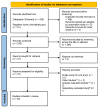Medicines for Obesity: Appraisal of Clinical Studies with Grading of Recommendations, Assessment, Development, and Evaluation Tool
- PMID: 36771314
- PMCID: PMC9919203
- DOI: 10.3390/nu15030606
Medicines for Obesity: Appraisal of Clinical Studies with Grading of Recommendations, Assessment, Development, and Evaluation Tool
Abstract
We evaluated the quality of evidence from phase III/IV clinical trials of drugs against obesity using the principles of Grading of Recommendations, Assessment, Development, and Evaluation (GRADE) tool. Our systematic review evaluates the quality of clinical evidence from existing clinical trials and not the pharmacological efficacy of anti-obesity therapies. A literature search using select keywords in separate was performed in PubMed and ClinicalTrials.gov databases for phase III/IV clinical trials during the last ten years. Our findings indicate that the quality of existing clinical evidence from anti-obesity trials generally ranges from low to moderate. Most trials suffered from publication bias. Less frequently, trials suffered from the risk of bias mainly due to lack of blindness in the treatment. Our work indicates that additional higher-quality clinical trials are needed to gain more confidence in the estimate of the effect of currently used anti-obesity medicines, to allow more informed clinical decisions, thus reducing the risk of implementing potentially ineffective or even harmful therapeutic strategies.
Keywords: GRADE evaluation; clinical evidence; clinical pharmacology; obesity.
Conflict of interest statement
Theodosios D. Filippatos reports lecture honoraria from Boehringer Ingelheim, Mylan, Vi-atris, Astra Zeneca, Lilly, Recordati, Bausch Health, Servier and Innovis. All other authors report no conflicting interests.
Figures

Similar articles
-
The future of Cochrane Neonatal.Early Hum Dev. 2020 Nov;150:105191. doi: 10.1016/j.earlhumdev.2020.105191. Epub 2020 Sep 12. Early Hum Dev. 2020. PMID: 33036834
-
No. 367-2019 Canadian Guideline for Physical Activity throughout Pregnancy.J Obstet Gynaecol Can. 2018 Nov;40(11):1528-1537. doi: 10.1016/j.jogc.2018.07.001. Epub 2018 Oct 5. J Obstet Gynaecol Can. 2018. PMID: 30297272
-
Pre-surgical Nasal Decolonization of Staphylococcus aureus: A Health Technology Assessment.Ont Health Technol Assess Ser. 2022 Aug 23;22(4):1-165. eCollection 2022. Ont Health Technol Assess Ser. 2022. PMID: 36160757 Free PMC article. Review.
-
The effect of weight management interventions that include a diet component on weight-related outcomes in pregnant and postpartum women: a systematic review protocol.JBI Database System Rev Implement Rep. 2015 Jan;13(1):88-98. doi: 10.11124/jbisrir-2015-1812. JBI Database System Rev Implement Rep. 2015. PMID: 26447010
-
Corticosteroids for septic arthritis in children.Cochrane Database Syst Rev. 2018 Nov 21;11(11):CD012125. doi: 10.1002/14651858.CD012125.pub2. Cochrane Database Syst Rev. 2018. PMID: 30480764 Free PMC article.
Cited by
-
Analysis of inequities between demographic and social determinants associated with overweight and obesity.Rev Bras Epidemiol. 2025 Jul 21;28:e250038. doi: 10.1590/1980-549720250038. eCollection 2025. Rev Bras Epidemiol. 2025. PMID: 40699055 Free PMC article.
-
Cardiovascular Profile and Cardiovascular Imaging After Bariatric Surgery: A Narrative Review.Medicina (Kaunas). 2025 Jan 4;61(1):73. doi: 10.3390/medicina61010073. Medicina (Kaunas). 2025. PMID: 39859054 Free PMC article. Review.
-
Lipid-based nano-carriers for the delivery of anti-obesity natural compounds: advances in targeted delivery and precision therapeutics.J Nanobiotechnology. 2025 May 7;23(1):336. doi: 10.1186/s12951-025-03412-z. J Nanobiotechnology. 2025. PMID: 40336110 Free PMC article. Review.
References
-
- Webster J.D., Hesp R., Garrow J.S. The Composition of Excess Weight in Obese Women Estimated by Body Density, Total Body Water and Total Body Potassium. Hum. Nutr. Clin. Nutr. 1984;38:299–306. - PubMed
Publication types
MeSH terms
Grants and funding
LinkOut - more resources
Full Text Sources
Medical

